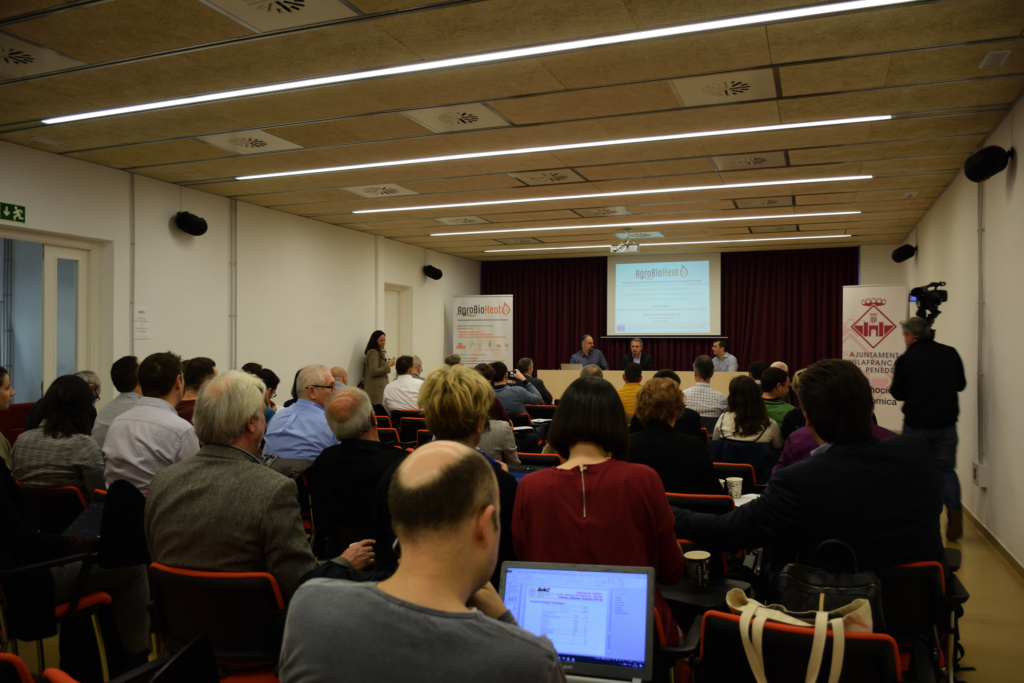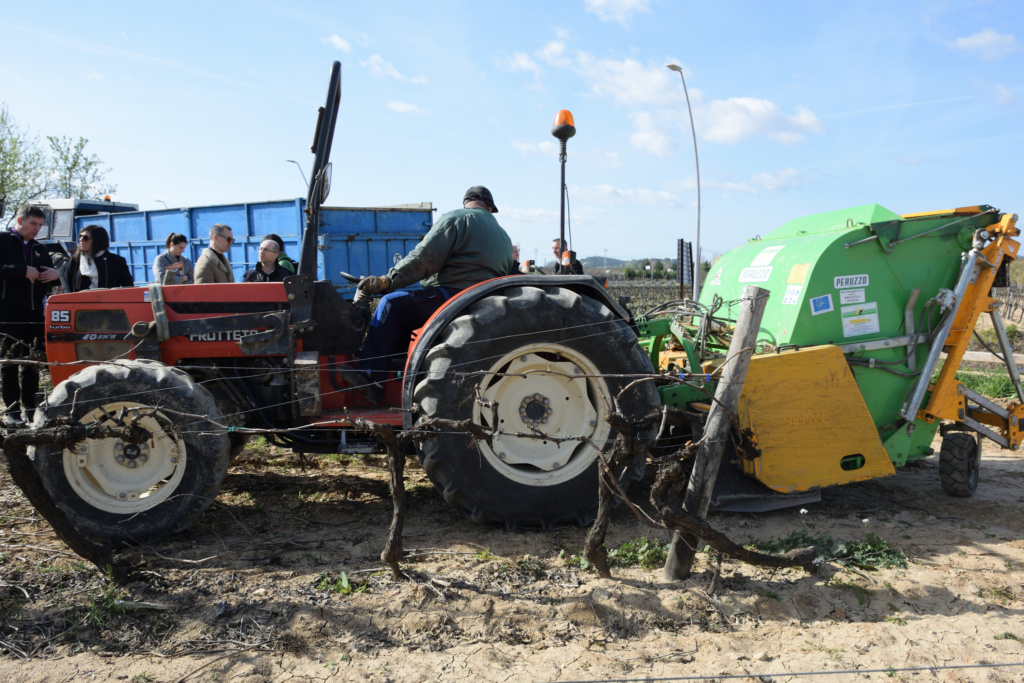Using vineyard prunings for heat in the Penedès: a European success case
European stakeholders from the entire agrobiomass value chain for energy gathered from February 25th to 27th in the Barcelona municipality of Vilafranca del Penedès at a demonstration workshop within the European project AgroBioHeat.
According to Manolis Karampinis, research associate at Centre for Research and Technology Hellas and coordinator of the AgroBioHeat project, Vilafranca has been chosen as the venue for the third project meeting (on 25 – 26 February) and the Open Workshop (on 27 February) because it is an excellent success case in the energy valorisation of vineyard prunings, whose model can be replicated elsewhere.
During the open workshop, data regarding the enormous potential of vineyard prunings as solid biofuel in Europe and success stories from all over Europe were shown by Mr. Karampinis. Laura Carbó, environmental technician of the city council also presented the local experiences achieved through the Vineyards4heat project.
The event was attended by fifty participants, coming from several Spanish regions (Castilla and León, La Rioja, Álava, Castilla-La Mancha) and other European countries (Croatia, France, Greece, Moldova, Romania) where the vineyard area is important. Among them, representatives of wineries, agricultural cooperatives, engineering companies, boiler manufacturers and installers, energy agencies and local action groups.

The AgroBioHeat project workshop in Vilafranca del Penedés
How Vilafranca uses the energy of the vineyard prunings?
The town uses the prunings of the vineyards, from which the famous Penedés wine is obtained, to feed a biomass boiler that supplies a municipal heat network with which several facilities have been heated since 2018. Currently, the municipal company d’Aigües de Vilafranca is in charge of managing the heat network.
Jordi Cuyàs, counselor at the municipal company d’Aigües de Vilafranca, explains that it “a product that was previously thrown away is transformed into useful heat for citizens at a lower price than gas.” Cuyàs was also the promoter of the Vineyards4heat project, thanks to which the municipality began to valorise the vineyard prunings.
The supply of vineyard prunings to the heat network is carried out by the wine cooperative “La Granada” which, among other services to associated farmers, offers to collect vineyard prunings for a lower cost than doing it individually.
The “La Girada” heat network has a 500 kW Heizomat biomass boiler fed exclusively by vineyard prunings to provide thermal energy to the connected public buildings.
Albert Casas, technician of the installer company ISVED, explained that the equipment is designed as standard to use various solid biofuels and only requires adjusting its operation to the specific agrobiomass, in this case, the vineyard prunings.
The boiler has a large combustion chamber, where low density biomasses can be combusted, which generate high ash contents – up to 8 times higher than those generated by forestry woody solid biofuels – and may contain improper materials such as stones, sand, etc. Emissions are comfortably within current legal limits.
In mechanised collection, the collection-crusher tractor demonstrated how it lifts the prunings arranged in lines throughout the farm, avoiding to a great extent dragging stones or sand. It crushes them as it progresses and at the end it unloads the crushed material to a truck.

According to Laura Carbó, environmental technician of the city council, the region has enormous potential, with a vineyard prunings production that ranges between 600 and 800 kg per hectare. At the moment, they only need to collect 400 hectares per year, but the objective is to continue installing more boilers and act on more surface.
As a culmination of the day, the well-known wineries of Familia Torres opened the doors and showed their modern facilities, including the 2.6 MW steam boiler that uses vineyards prunings mixed with forestry biomass to produce, above all, process cold. Workshop participants also had the chance to learn more about the sustainability project, Torres & Earth, launched by the company in order to reduce the environmental footprint of its wine product and adapt to the challenges of climate change.
The Vilafranca del Penedés city council made a great effor to facilitate the celebration of the workshop with enthusiasm and professionalism. From the deputy mayor Aurelio Ruiz, who opened the day, to the department of international relations, with the councilor Xell Montserrat and her chief of service, Carme Ribes. The support of Familia Torres and the Biomass Cluster from Catalunya is also gratefully acknowledged.
The AgroBioHeat project
The Worskshop and Fields visits were organised by AgroBioHeat project partners AVEBIOM – Spanish Biomass Association and Centre for Research and Technology Hellas.
The AgroBioHeat project is funded through European Union’s Horizon 2020 research and innovation programme under Grant Agreement No 818369. AgroBioHeat promotes the efficient use of agrobiomass to obtain energy in rural Europe. Its ultimate goal is to achieve a massive deployment of improved agro-biomass heating systems in Europe. Currently, the project actively seeks initiatives to provide technical support and contribute to its successful implementation.
Agrobiomass is an abundant local resource, under-utilised for energy uses. Its efficient use can contribute to achieving the European Energy and Climate objectives, while promoting rural development and the circular economy.
More information and contact details, please visit the project website at www.agrobioheat.eu or the project social media on Facebook and LinkedIn or follow the #AgroBioHeat hashtag on Twitter.
WORKSHOP PRESENTATIONS
Disclaimer: This press release reflects only the author´s view. The Innovation and Networks Executive Agency (INEA) is not responsible for any use that may be made of the information it contains.

